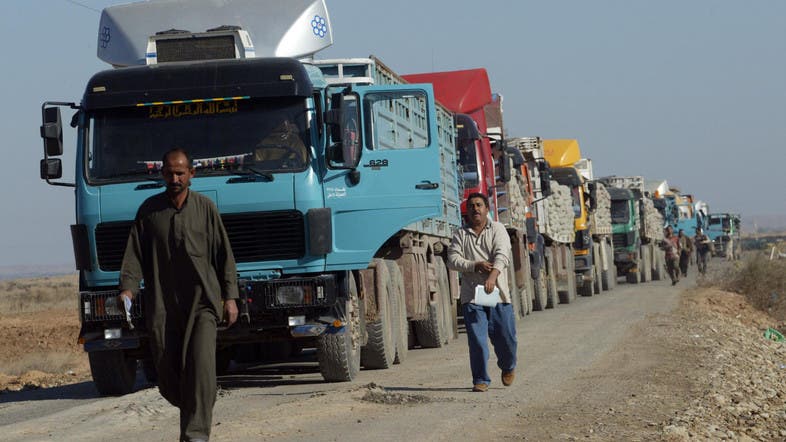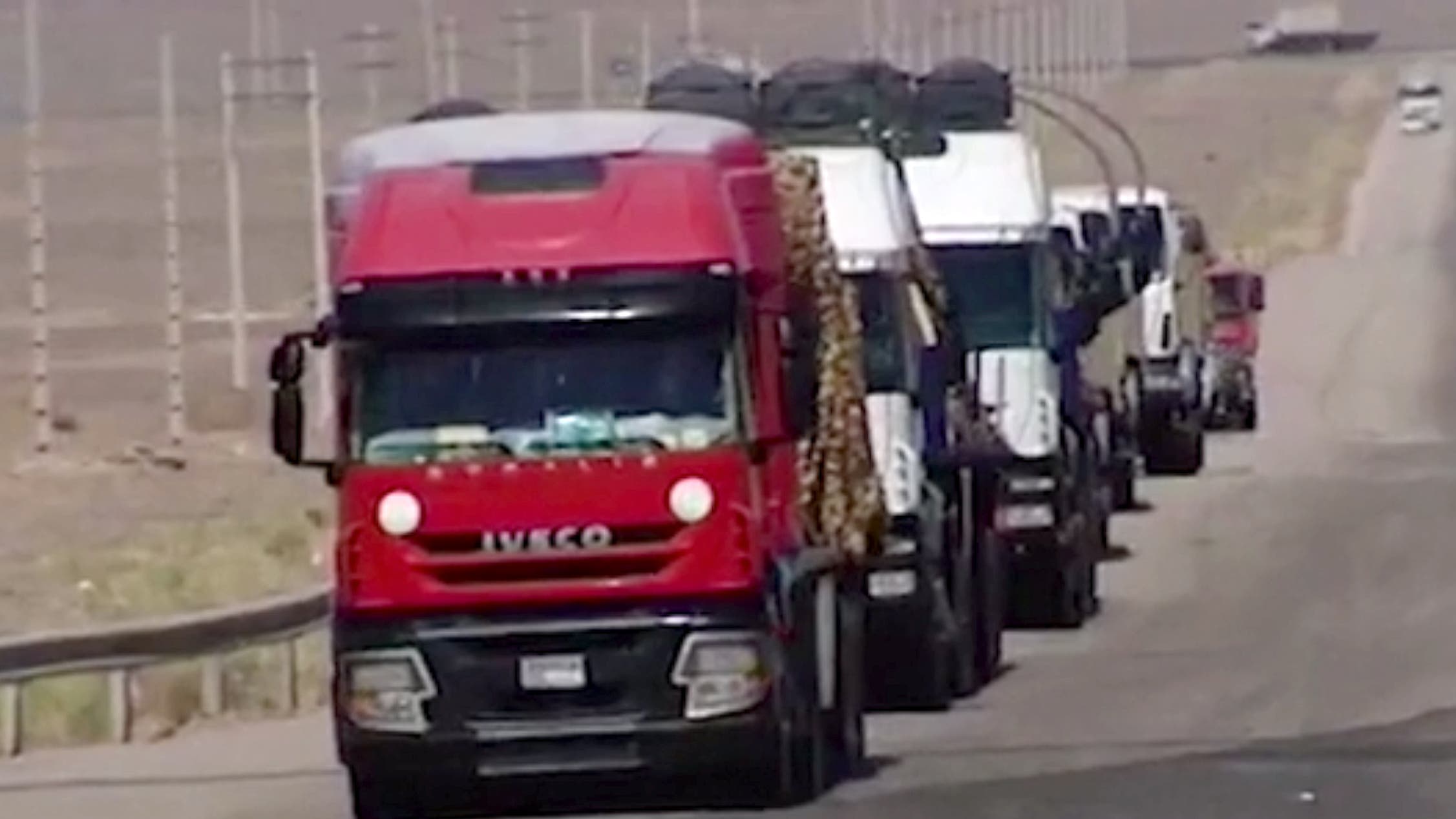ANALYSIS: Why Iran’s truckers strike is not an isolated incident
- Get link
- X
- Other Apps
ANALYSIS: Why Iran’s truckers strike is not an isolated incident

Iran is faced with a second round of truckers’ strikes this year. It has spread to 290 cities in 31 provinces across the country.
Last round of truckers’ strike was in late July and early August. The demands remain the same because the Iranian regime is offering them a bunch of empty promises. The regime wants the truckers to break their strike and it has made hundreds of arrests so far.
Mohammad Jafar Montazeri, the regime’s Chief Prosecutor General said on September 29th: “According to the information we have, in some routes, some of the cities, there are elements who are provoking some of the truckers, or possibly blocking them and creating problems for them.
They are subject to the rules and regulations of banditry and the punishment of the bandits according to the law is very severe, sometimes resulting in the death penalty.” Around 240 strikers have been arrests according to human rights activists in Iran.
On September 30th, judiciary’s spokesman Iranian regime’s woes exposed at the UN General Assembly added: “Those provoked by the enemy to disrupt the transport system should be reminded that a heavy punishment is waiting for the rabble-rousers… All the prosecutors across the country have been called up to detain disrupters with the help of security forces without hesitation.”
Colonel Kavos Mohammadi, a deputy of the Fars provincial police force, described the strikers as “disrupters of the order,” and said: “Following the disrupting acts of some of these people on the roads of Fars ... After the visible and invisible patrol of officers, 22 thugs and disrupters of public order on the roads were arrested and, after filing a case, they were sent to the judiciary authorities and through them to the prisons. Police will deal with sensitivity and vigilance with the smallest insecurity factors in coordination with the judiciary, and the process of confronting with the disrupters of order and security of the roads and axes of Fars province will continue on a daily basis. The police monitor and control all the roads in this province, visibly and invisibly, and resolutely deal with all elements of disrupters of order and security in these areas.”
What do truckers want?
The strikers’ demands are for better pay for meeting Iran’s sky rocking living costs. They specified demands such as base charges according to “tons per kilometer”; restructuring the truckers’ guild through free elections; the decrease in truck prices; providing spare parts and tires through government rated currency (42,000 rials per US dollar); increasing drivers’ salaries and a 35 percent increase in transfer rates; increasing retirement pensions, especially considering skyrocketing inflation and prices.
They are also calling for an increase in road safety and security; supervision over fees demanded by transportation companies; decreasing commissions for loads and renovating the truck fleet; providing fuel rations for transport trucks and providing this fuel on a permanent basis to the drivers and truck owners; decreasing highway tolls; controlling the process of load terminals and providing health and recreational facilitation for the drivers at the city and border loading stations;punishing authorities that bribe the drivers.
Although the list is long but has a simple message: truckers are unhappy as are the rest of the Iranian people with this regime.

This image made from video broadcast on Iranian State Television shows trucks outside Fordo nuclear facility in Iran on Monday, Aug. 29, 2016. (Iran State Television via AP)
Growing protests
Latest reports indicate fuel truck drivers working for refineries in Tabriz, Kerman, Bandar Abbas, Arak, Kazerun, Qazvin, Sari, Ahvaz, and Abhar joined their fellow truckers in strike.
Jamal Hamidi, director of the loading station in Bandar Khomeini of Khuzestan Province (southwest Iran) said on October 3: “On Sunday, most truck drivers at the loading station went on strike. While 2,000 trucks are active in this loading station each day, only 300 accepted to load any goods on Sunday.”
Two weeks into the strikes, despite attempts by the regime to break it up, there are no signs of truckers giving in.
Domestic support
Most of Iranian workers unions unanimously voice their support for striking truckers. The Syndicate of Workers of Tehran and Suburbs Bus Company (SWTSBC); Haft Tapeh Sugar Refinery Workers Syndicate and teachers are supporting the strikes. The American Teamsters Union, the largest in Northern America, throws its support behind fellow drivers in Iran. This is the second time this year that the Teamsters’ Union supported the striking drivers in Iran.
James P. Hoffa General President of the International Brotherhood of Teamsters, which has 1.4 million members in the US and Canada wrote a letter to Deputy Director of Iran’s interests in the US, Abolfazl Mehrabadi and urged the Iranian Regime to listen to the demands of the striking workers.
The letter read in part: “We urge the government of Iran to listen to the grievance of striking Iranian truck drivers, address their just demands and recognize their internationally recognized rights to assembly, speech, freedom of association and collective bargaining.”
The International Transport Workers’ Federation (ITF) expresses its concern about the Iranian government’s reaction to the latest industrial action by truck drivers, which is in its second week. IFT said: “The ITF is extremely concerned that news emerging from Iran has detailed a large number of driver arrests.”
IFT’s statement added:” Most seriously, the ITF understands that Iran’s attorney general, Mohammad Jaafar Montazeri, has suggested that those who initiated the protest actions will be subject to the death penalty, citing a threat to national security. His comments have been echoed by other clerics.”
ITF head of inland transport Noel Coard said: “We are very concerned about the situation. Let it be clear that ITF unions globally voice their solidarity and stand alongside the truckers of Iran in their fight to defend workers’ rights.”
It is a big mistake to see the truckers’ strike as an isolated incident. It is well connected to other protests taking place everyday in Iran because they have the same roots. The country has been in turmoil since January and Supreme Leader Ali Khamenei is trying very hard to play it down.
_____________________________
Reza Shafiee is a member of the Foreign Affairs Committee of the National Council of Resistance of Iran (NCRI). He tweets @shafiee_shafiee.
_____________________________
Reza Shafiee is a member of the Foreign Affairs Committee of the National Council of Resistance of Iran (NCRI). He tweets @shafiee_shafiee.
- Get link
- X
- Other Apps

Comments
Post a Comment